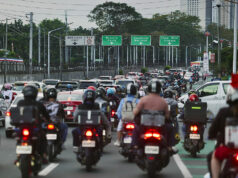BSP may revise inflation view ahead of wage rulings
By Melissa Luz T. Lopez,
Senior Reporter
THE CENTRAL BANK could be gearing up for a rate hike as early as March, with concerns over the inflation impact of higher taxes likely to prod policy makers to reassess their forecasts, a global bank said.
Jose Mario I. Cuyegkeng, senior economist at ING Bank N.V. Manila, said the Bangko Sentral ng Pilipinas (BSP) could be considering monetary policy adjustments sooner amid concerns over the impact of the tax reform law which took effect this January.
“BSP would likely come out with a revised inflation forecast at the next policy rate meeting on Feb. 8. A higher inflation forecast may presage a tightening move by BSP,” the bank said in a report published yesterday.
The Monetary Board expects full-year inflation to average 3.4%, higher than the 3.2% logged in 2017. Central bank officials have said that they expect new taxes to add less than one percentage point to overall inflation, enough to keep price movements manageable.
On Tuesday, BSP Governor Nestor A. Espenilla, Jr. said the central bank “may need to react” to second-round effects of the Tax Reform for Acceleration and Inclusion (TRAIN) law, noting that it will now have to factor in the tax adjustments to their baseline inflation forecasts.
Mr. Espenilla said the central bank’s Feb. 8 policy review — its first for the year — will turn out to be “interesting,” as the monetary authority reviews its inflation assessments.
Enacted as Republic Act No. 10963, the TRAIN reduces personal income tax rates and provided a simpler system for computing donor and estate taxes. Foregone revenue will be offset by the removal of some exemptions from value-added tax, alongside higher tax rates for fuel, cars, capital gains and new taxes for sugar-sweetened drinks, among others.
Mr. Cuyegkeng said the central bank appears to have “turned more cautious” about the inflation outlook.
“BSP in the past viewed the inflation impact as transitory which would not require a monetary policy response. But second-round effects are looming and could threaten the inflation target range of 2% to 4%,” the bank economist said, referring to potential increases in transport fares and wage hike petitions.
“We estimate that a 25% increase in minimum transport fares could raise inflation by as much as 1 ppt (percentage point) on CPI (consumer price index).”
ING expects the government to rule on fare petitions by March or April, while regional wage boards are also expected to assess proposals for salary adjustments within the second quarter.
“We believe that the possibility of BSP raising its policy rate at the March 22 meeting has increased,” Mr. Cuyegkeng added, even as he maintains his view that a rate hike from the BSP will come between April and June.
“In the meantime, we believe that BSP would likely prepare the market for a tightening move at the February 8 meeting.”
The Monetary Board has kept its policy stance unchanged since September 2014, although procedural changes have been introduced in June 2016 for the shift to an interest rate corridor. Benchmark rates currently range from 2.5-3.5%.
Analysts have been flagging the need for the central bank to tighten rates to keep up with rising inflation and contain the build-up of risks in the financial system, as well as with rising global yields as the United States tightens its monetary policy further.



